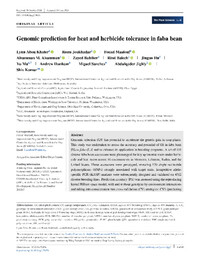Genomic prediction for heat and herbicide tolerance in faba bean

Authors:
Genomic selection (GS) has potential to accelerate the genetic gain in crop plants. This study was undertaken to assess the accuracy and potential of GS in faba bean [Vicia faba (L.)] and to enhance its application in breeding programs. A set of 118 diverse faba bean accessions were phenotyped for key agronomic traits under herbicide and heat stress across 16 environments in Morocco, Lebanon, Sudan, and the United States. These accessions were genotyped, revealing 170 single nucleotide polymorphisms (SNPs) strongly associated with target traits. kompetitive allele-specific PCR (KASP) markers were subsequently designed and validated on 4512 diverse breeding lines. Prediction accuracy (PA) was assessed using the reproducing kernel Hilbert space model, with and without genotype-by-environment interactions and taking into consideration two cross-validation (CV) strategies: CV1 (predicting new lines) and CV2 (predicting complete records from unbalanced data). Additionally, 75 KASP markers with known association with heat tolerance traits were prioritized to estimate the PA of the models. The results showed a comparable PA between the two models, with CV1 outperforming CV2. This highlighted the difficulty in predicting the performance of untested lines in tested environments compared to lines evaluated in some environments but not others. Moreover, SNP subset size and composition significantly impacted PA, especially under heat stress. The highest accuracies were observed for days to flowering and plant height under heat stress and for plant height and grain yield under herbicide environments, indicating that these traits are ideal for training population selection. Optimizing the size and composition of the training population will enhance the effectiveness of GS in faba bean breeding.
